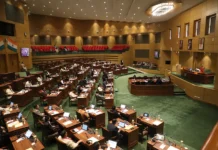Monday Musing
[ Amar Sangno ]
The departmental promotion of inspectors as deputy superintendents or assistant commandants in the three different units of the Arunachal Pradesh Police (APP) – civil, the Arunachal Armed Police Battalion (AAPBn), and the Indian Reserve Battalion (IRBn) – has been smouldering for years and has become a bone of contention between the civil and the IRBn police personnel.
The promotion of four 2004 batch IRBn inspectors as assistant commandants on 2 April, 2020, gave a spark to the long-smouldering issue. Four IRBn inspectors were promoted under the existing Arunachal Pradesh Police Service Rule, 1989.
The civil inspectors decried that the promotion of four IRBn inspectors as assistant commandants deprived 110 civil inspectors, including 1998 civil police batch, superseding their 16 years of service seniority. Among the 110 civil police inspectors, 14 were promoted as DSP alongside four IRBn inspectors on the same date in April 2020.
There are six more civil inspectors of the 1989 batch, and 11 from the 1990 batch are yet to be promoted.
The APP civil was raised in 1972, the AAPBn in 1988 and 1989, and the 1st IRBn in 1997. Presently, there are five battalions in the IRBn – the 2nd IRBn (raised in 2002), the 3rd IRBn (2008), the 4th IRBn (2011), and the 5th IRBn (2012).
The seniority list of the rank of constable up to sub-inspector of these three units of the state police are being separately maintained since inception without any hurdle and being treated as a separate cadre. However, for the inspector rank, the common seniority list applies.
The posts of APPS (entry grade) created against the units of civil police/AAPBn and IRBn recruitment/promotion criteria are common. The APPS is a common cadre and promotion of entry grade is made from the senior most inspector of the APP on the basis of merit and seniority of those who have completed five years of service in the rank of inspector.
Posting of APPS entry grade are interchangeable in the units. On induction into the entry grade, their postings are made as per the functional requirement of the district or unit.
A group of civil inspectors had submitted a representation to the chief minister on 11 November, 2020, against the government approval of common cadre rule of the APP. The group argued that approval of common cadre and its implementation would cause serious prejudice, injustice and discrimination to the large number of civil police who are much senior to the IRBn cadre or the APPBn personnel.
It further argued that making a common cadre with prospective effect would not resolve the confronting problems in the civil police unless such common cadre is implemented retrospectively or cancel it to resolve the burning issue of the civil police.
“The government’s proposal on prospective common cadre does not address the core problem of superannuation of senior civil police officers who got very late promotion as inspectors, though much senior than the SIs in the IRBn,” said a civil inspector on condition of anonymity.
They claimed that the cadre management issue started in the police department with the promotion of 4th IRBn sub-inspectors to the rank of inspectors on 22 October, 2008, after the promotion of their names were included in the seniority list of civil inspectors, superseding the much senior civil sub-inspectors of the 1988 batch, on 28 May, 2009.
The civil sub-inspectors went to the high court to protect their promotion and sought the court’s intervention in the matter of cadre separation. The high court passed a judgment on 13 May, 2015 over WP (C) No 42/2012, and quashed the decision of the common seniority list and asked the department to prepare separate seniority lists of civil, IRBn and AAPBn.
In pursuance of the high court order, a board was constituted on 9 October, 2015, which recommended maintaining of a separate seniority list of inspectors and high feeder posts for various units. It also recommended separate cadres of the civil police, the IRBn and the AAPBn from the rank of constable to SP by earmarking certain senior promotional posts of the APPBn and the IRBn from the rank of assistant commandant and deputy commandant.
Currently, the PHQ or the home department has not conducted cadre review of inspectors and there is absence of seniority list in the police department.
On the other hand, the IRBn inspectors are also claiming deprivation and injustice being meted out to them. It is said that the 17 IRBn inspectors who are under the promotional zone are being affected. In its representation, the IRBn inspectors claimed that only four assistant commandants were promoted from inspectors, and the rest of the posted officers are drawn from the AGMUT/APPS cadre against their sanctioned posts.
“Since our inception, all the post of assistant commandant has been filled up on the basis of common cadre system and the officers of IRBn has been deprived from timely promotion against the sanctioned post,” the representation stated.
“A robust and clear-cut guideline must be formulated by amending the existing recruitment rules and making it more stringent in terms of transfer and posting and defining the nature of work, scope and responsibilities,” it added.
On 3 September, 2015, the then AIGP Tusar Taba apprised the home department of the vacancy in APPS entry grade, wherein he informed that the total sanctioned posts pf APPS entry grade is 65 in APPS, (Civil-20, AAPBn-12 and IRBn-33). As per the APPS Rule, 50 percent of the posts are filled by direct recruitment and 50 percent of the posts are promotion.
Seeking resolution of the perpetual issue of cadre management, the then DGP, RP Upadhayaya, had written a letter to the home commissioner on 6 July, 2020.
He observed: “The prevailing system of different cadres of civil police, AAPBn and IRBn is leading to lack of synergy and avoidable litigation. Manpower and resources are being ineffectively utilised due to this fragmentation.”
“The perpetual issue of cadre management by having a common cadre is ab initio. However, for implementation to be effective, it has to be not retrospective but with prospective effect,” the then DGP had added.
“This is the only way out of the perpetual issues of inequity and relative deprivation arising out of different cadres. This will bring sense of esprit de corps among the force, leading to better command, control, discipline and morale of the force” he concluded.
The government gave approval on the common cadre rule, which was conveyed by Chief Minister Pema Khandu on 8 October, 2020 from the rampart of the Police Training Centre in Banderdewa during the 48th APP raising day.
It’s been three years and the police headquarters is unable to conduct DPC meeting despite the government’s direction to conduct DPC meeting every six months.
The cadre management crisis in the state police reflects lack of farsighted leaders in the state disciplinary force, as well as of the government. Absence of a proper roadmap in regards to career progression of the inspectors rank of the three units may fuel further discontentment among the forces, which would have far-reaching effect on the chain of command and discipline.


